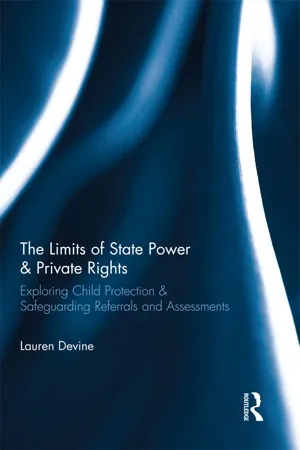
The Limits of State Power & Private Rights
Exploring Child Protection & Safeguarding Referrals and Assessments
- 209 pages
- English
- ePUB (mobile friendly)
- Available on iOS & Android
The Limits of State Power & Private Rights
Exploring Child Protection & Safeguarding Referrals and Assessments
About This Book
This book tackles a complex area of law, social policy and social work, providing a comprehensive analysis of the theoretical, practical and legal boundaries of State power following safeguarding and child protection referrals in England. The book examines the history, rationale and implications of the current position, concluding that the balance of power is weighted in favour of the State.
The Limits of State Power & Private Rights is ground-breaking in its approach to the subject and its detailed, critical analysis. Traditionally the subject matter of the book is considered within a welfare framework. The analysis in this book argues that a policing agenda is embedded within policy but without appropriate safeguards and controls, creating potentially irreconcilable tension described by the author as the 'welfare/policing dichotomy'.
This book is of importance to academics, lawyers, social workers, policy makers, practitioners and service users. The book is written so as to be accessible to a multi-disciplinary audience, but is sufficiently detailed so as to be suitable for specialists and non-specialists alike in this subject area. The chapters include introductory and contextual sections as well as doctrinal, theoretical and socio-legal analysis. Although the focus is on the English system, the book is equally applicable to the many worldwide jurisdictions adopting the Anglo/American 'child rights' based framework of child protection. It is also of use as a comparative work in countries where a family support based system is practiced.
Frequently asked questions
Table of contents
- Cover
- Half Title
- Title Page
- Copyright Page
- Dedication
- Table of Contents
- List of figures
- List of tables
- Table of cases
- Preface
- Acknowledgements
- Introduction
- 1 Development of the State’s role: child welfare and family policing
- 3 Identifying families for policing
- 4 The policing of parents: social work involvement
- 5 Paradigms, policy and policing
- 6 The balance of State power and private rights: considering the protections for children and parents
- 7 The question of remedies
- 8 Reforming policy: the politics of change
- Conclusion
- Index